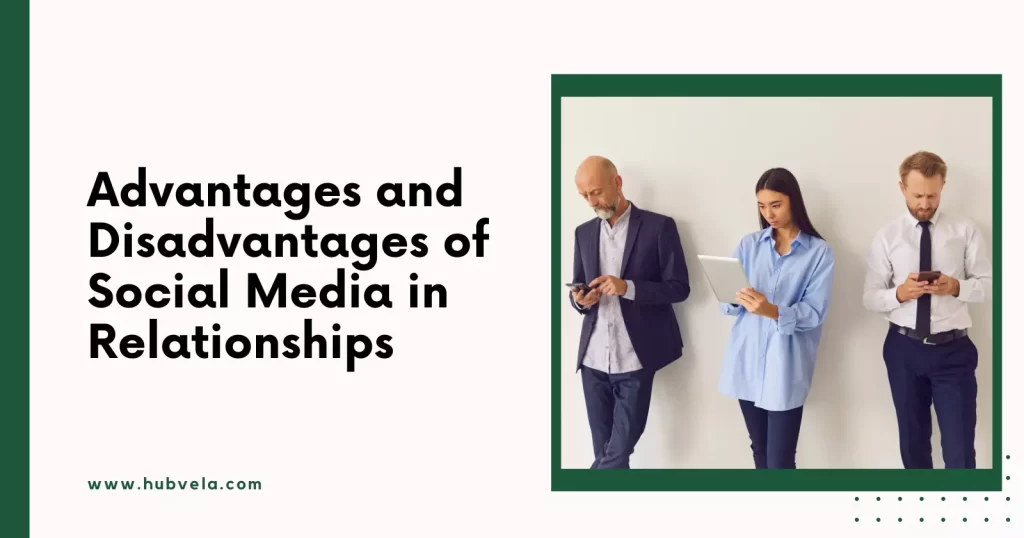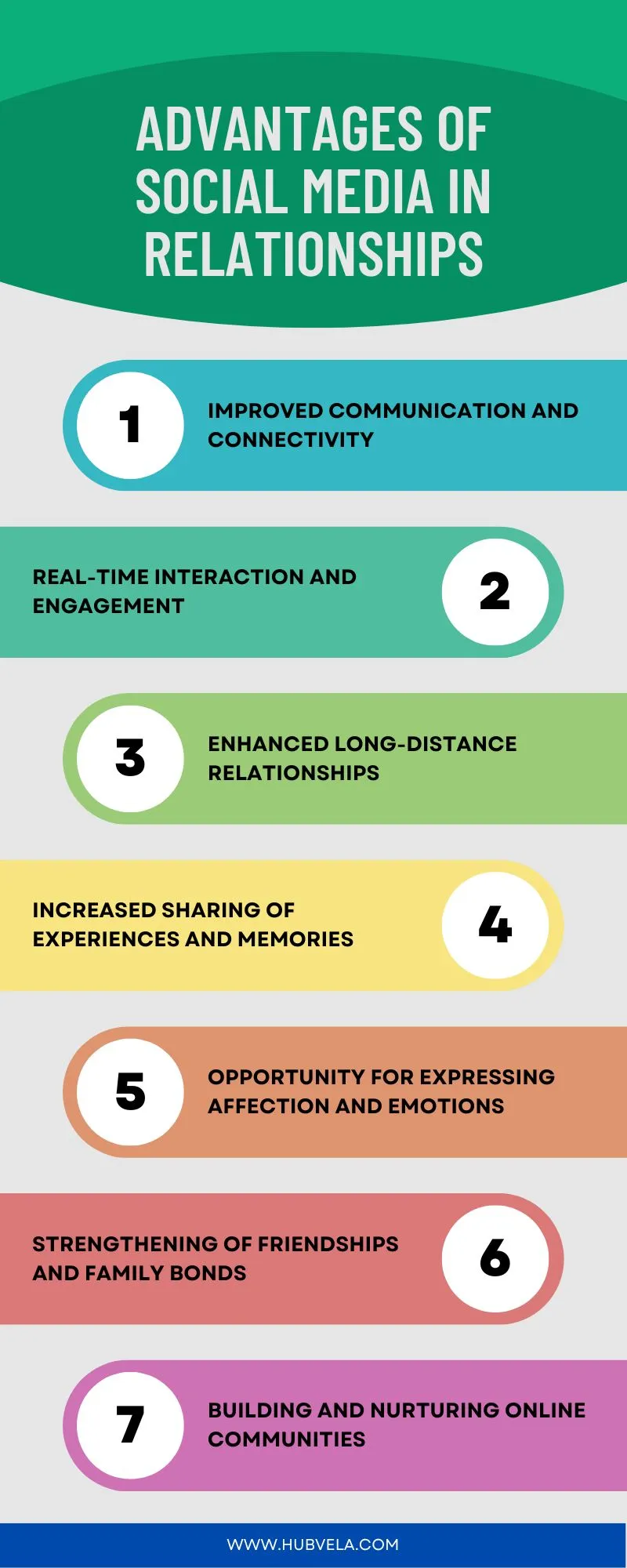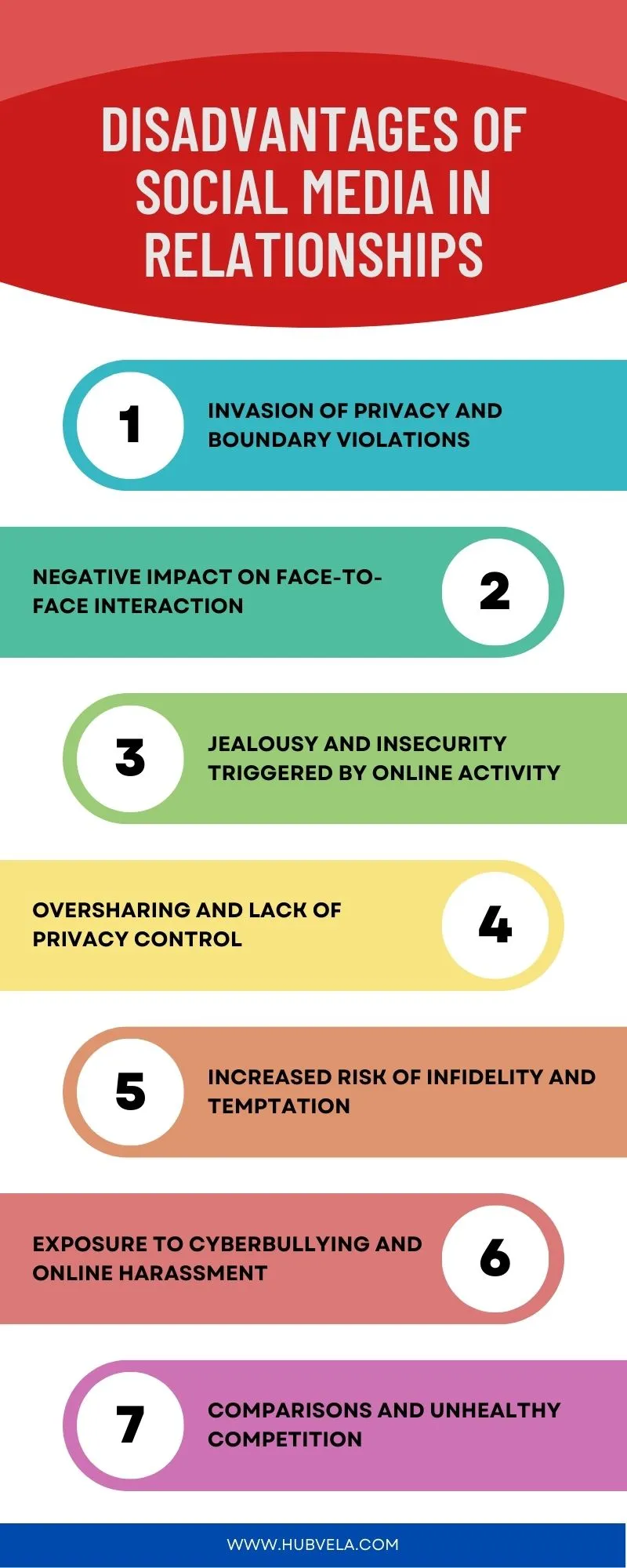Social media has become an integral part of our lives, and it has had a significant impact on various aspects of our lives, including relationships.
While social media can help people stay connected and improve communication with their partners, it can also lead to less quality in-person time and relationship dissatisfaction.
In this article, we will explore the advantages and disadvantages of social media in relationships.
We will examine how social media affects relationships, both positively and negatively, and how it can be incorporated into relationships in a healthy way.

--Advertisement--
Advantages of Social Media in Relationships
Social media has become an integral part of our lives, and it has impacted various aspects of our lives, including our relationships. While some people argue that social media has a negative impact on relationships, others believe that it can be beneficial.
We will explore the advantages of social media in relationships. Social media can be a valuable tool for maintaining and building relationships, especially long-distance ones.
It can also help people forge new friendships, stay in touch with old friends, and keep couples connected.
We will discuss some of the positive aspects of social media that can help maintain healthy relationships.

1. Improved Communication and Connectivity
Improved communication and connectivity are some of the key advantages of social media in relationships. Social media platforms provide a convenient and efficient way for people to stay in touch with their loved ones, regardless of their location.
With social media, people can communicate in real-time through instant messaging, voice, and video calls, and even share photos and videos. This has made it easier for people in long-distance relationships to stay connected and maintain their bond.
Social media has also made it possible for people to reconnect with old friends and acquaintances, which can be beneficial for those who have lost touch over the years.
Social media has revolutionized the way people communicate and stay connected, making it an essential tool for maintaining healthy relationships.
2. Real-Time Interaction and Engagement
Real-time interaction and engagement are some of the key advantages of social media in relationships. Social media platforms allow couples to communicate with each other in real time, regardless of their physical location.
This means that couples can stay connected and engaged with each other throughout the day, even if they are not able to be together in person.
Social media also provides a variety of ways for couples to interact with each other, such as messaging, video calls, and sharing photos and videos.
These features allow couples to share their experiences and emotions with each other in a more immediate and intimate way, which can help to strengthen their relationship.
Additionally, social media can provide a platform for couples to engage with each other’s social networks, which can help to build a sense of community and support around their relationship.
Real-time interaction and engagement through social media can be a valuable tool for couples looking to maintain and strengthen their relationship.
3. Enhanced Long-Distance Relationships
One of the significant advantages of social media in relationships is its ability to enhance long-distance relationships. In the past, maintaining a long-distance relationship was challenging due to limited communication options.
However, with the advent of social media platforms, couples in long-distance relationships can now stay connected and engaged with each other on a daily basis.
Social media provides various tools and features that allow couples to communicate through text messages, voice calls, video chats, and even virtual dates.
These platforms also enable couples to share their daily lives, photos, and videos, making them feel more connected and involved in each other’s lives.
Additionally, social media allows for real-time updates and instant communication, reducing the feelings of distance and loneliness that often accompany long-distance relationships.
Social media has revolutionized long-distance relationships by providing a convenient and interactive way for couples to stay connected and maintain their bond, regardless of the physical distance between them.
4. Increased Sharing of Experiences and Memories
Sharing experiences and memories is an important aspect of relationships, and social media can facilitate this process.
Social media platforms provide users with a way to document and share their lives with their friends, family, and followers, from sharing pictures of important events to posting throwback photos.
By sharing experiences and moments with others, people can connect with each other and relive moments, learn from their experiences, and strengthen their relationships.
Social media can also help people stay connected to long-distance friends and family members or improve communication with their partners, children, and healthcare professionals.
Moreover, researchers have found that memories of personal experiences improve when they’re posted on social media. Therefore, social media can be a useful tool for increasing the sharing of experiences and memories in relationships.
5. Opportunity for Expressing Affection and Emotions
Social media provides an opportunity for expressing affection and emotions in relationships, according to research conducted by the Pew Research Center.
The study found that 44% of respondents felt that social media helped them feel emotionally closer to their significant other, with 10% feeling that way “a lot.”
Additionally, 47% of respondents said that social media offered a place for them to show how much they care about their significant other, with 12% feeling this way “a lot.” Social media also provides a space where many people can express public support or approval of others’ romantic relationships.
However, it is important to note that social media can also contribute to unhealthy comparisons and unrealistic expectations of what relationships are supposed to be like.
Therefore, it is important to use social media sparingly and focus on the relationship itself rather than curating an “image” of who you are.
6. Strengthening of Friendships and Family Bonds
Social media has been found to be a beneficial tool for strengthening friendships and family bonds. Social media platforms allow people to stay connected with friends and family members who may be far away, making it easier to maintain long-distance relationships.
Social media can also help people forge new friendships and strengthen existing ones by providing opportunities to connect with people who share similar interests or goals.
Social media can be used to organize events and meetings, which can help people socialize more and strengthen their bonds. Additionally, social media can help people communicate more effectively with their partners, children, and healthcare professionals.
However, it is important to note that excessive use of social media can lead to less quality in-person time spent with loved ones and relationship dissatisfaction.
Social media can be a valuable tool for strengthening friendships and family bonds if used effectively and in moderation.
7. Building and Nurturing Online Communities
Building and nurturing online communities is a crucial aspect of leveraging the advantages of social media in relationships. Online communities provide a platform for meaningful exchanges, support, and friendships.
By creating an online community, individuals and businesses can be seen as leaders in their respective spaces, expanding their network and audience.
These communities allow followers to discuss topics of interest, engage with brands or leaders, learn together, collaborate on projects, and share advice and news.
By using online communities as a content marketing channel, relationships and trust can be built with the audience, ultimately increasing brand awareness.
Online communities also offer a space for customers or followers to provide feedback, thoughts, and engagement, fostering meaningful relationships.
Online communities are a powerful tool for building connections, strengthening relationships, and fostering engagement in the digital realm.
Disadvantages of Social Media in Relationships
Social media has become an integral part of our daily lives, and it has revolutionized the way we communicate and interact with others.
While social media has many advantages, it also has its drawbacks, especially when it comes to relationships. We will explore the disadvantages of social media in relationships.

1. Invasion of Privacy and Boundary Violations
Social media can lead to an invasion of privacy and boundary violations in relationships. With the ease of access to personal information on social media, it is easy for individuals to cross boundaries and invade each other’s privacy.
This can lead to feelings of mistrust and jealousy, which can negatively impact the relationship. Research has shown that Facebook intrusion is linked to relationship dissatisfaction via jealous cognitions and surveillance behaviors.
Privacy invasion experiences on social media can also lead to privacy fatigue, which can cause users to become less vigilant about protecting their privacy.
It is important for individuals to establish clear boundaries and communicate their expectations regarding privacy on social media to avoid these negative consequences.
2. Negative Impact on Face-to-Face Interaction
Social media has had a negative impact on face-to-face interactions, which has been a major downside of social media.
One of the main issues is that social media has led to a decreasing amount of face-to-face interactions, which has affected the quality of these interactions as well.
People are not having intimate conversations and personal interactions with each other anymore, instead, they have turned to the internet to take away some of the nervousness that some may find in trying to start a relationship with another person.
This has led to a decrease in the value of intimate friendships and an increase in the value of social media.
Furthermore, social cues associated with face-to-face interactions, such as touching, eye contact, furrowing the brow, and gazing, increase intimacy, and can only become natural through constant physical interaction.
3. Jealousy and Insecurity Triggered by Online Activity
Jealousy and insecurity are common emotions that can be triggered by online activity in relationships. Social media can provide a platform for people to connect with others, including past partners, which can lead to feelings of jealousy and insecurity.
For example, seeing a partner liking or commenting on someone else’s post can cause feelings of jealousy and suspicion. Additionally, social media can create unrealistic expectations and comparisons, leading to feelings of inadequacy and insecurity.
This can be especially true when people present a curated version of their lives online, which can make others feel like they are not measuring up.
It is important for couples to communicate openly and honestly about their feelings and to establish boundaries around social media use to avoid these negative emotions.
4. Oversharing and Lack of Privacy Control
Oversharing and lack of privacy control are significant disadvantages of social media in relationships. Social media users tend to share as much information as possible, which can lead to oversharing and exposure to intimate details about their personal lives.
This can make individuals vulnerable to threats such as cyberstalking, cyberbullying, and cyber harassment. Additionally, oversharing can lead to embarrassment, conflict with loved ones, and judgment from others.
People may not realize they have shared too much until it’s too late. Oversharing on social media can also lead to feelings of depression, low self-esteem, and jealousy due to social comparison.
It is important to note that people use social media platforms even as they express great concern about the privacy implications of doing so.
Therefore, it is crucial to be mindful of the information shared on social media and to use privacy controls to limit the exposure of personal information.
5. Increased Risk of Infidelity and Temptation
Social media has redefined the rules of infidelity and increased the risk of temptation. The rise of social media has introduced unprecedented challenges into our lives, and one of the biggest problems with modern infidelity is that it takes place within the confines of a screen.
Unlike the physical act of driving over to your lover’s house and having sex, sending messages via social media is an act of unfaithfulness that doesn’t leave the online world.
This makes the affair feel as if it isn’t as real as a physical act of betrayal, and infidelity might occur due to a perceived lack of consequences.
Certain social media habits simply increase the chances of engaging in adulterous behavior online, such as spending too much time on social media.
Social media can set the stage for emotional affairs that most people would never imagine transpiring, and emotional affairs often begin as friendships and gradually develop when trust and boundaries are crossed.
The existence of social media can lead someone into marital infidelity because it is perceived as less harmful than action in real life.
6. Exposure to Cyberbullying and Online Harassment
Exposure to cyberbullying and online harassment is a significant disadvantage of social media in relationships. Cyberbullying refers to the use of electronic communication to harass, threaten, or humiliate someone.
Social media platforms provide a space where individuals can be targeted by cyberbullies, who may send mean messages, post hurtful comments, or spread rumors online. The effects of cyberbullying can be severe, leading to depression, anxiety, and even suicide.
Cyberbullying can also be anonymous, making it difficult for victims to report the bully or seek help.
Additionally, social media allows incidents of bullying to reach a wide audience within a short period of time, potentially causing embarrassment and lasting emotional harm.
It is crucial to be aware of the risks of cyberbullying and take steps to protect oneself and others from online harassment.
7. Comparisons and Unhealthy Competition
Comparisons and Unhealthy Competition refer to the negative effects that social media can have on relationships when individuals constantly compare themselves and their relationships to others.
Social media platforms often present an idealized version of people’s lives, showcasing their best moments and achievements.
This can lead to individuals comparing themselves and their relationships to others, which can be detrimental to their own well-being and their relationships.
Constantly comparing oneself to others can create feelings of inadequacy, jealousy, and insecurity, which can strain the relationship.
Unhealthy competition can arise when individuals start measuring the success of their relationship based on what they see on social media.
They may feel the need to compete with others in terms of relationship milestones, such as extravagant vacations, romantic gestures, or public displays of affection. This can create unrealistic expectations and put unnecessary pressure on the relationship.
Moreover, social media can amplify the fear of missing out (FOMO) phenomenon, where individuals feel anxious or left out when they see others seemingly having more exciting or fulfilling relationships.
This constant comparison can lead to dissatisfaction with one’s own relationship and a constant desire for more, which can be detrimental to the stability and happiness of the relationship.
To overcome the negative effects of comparisons and unhealthy competition on relationships, it is important for individuals to focus on their own relationships and prioritize open communication, trust, and mutual support.
It is crucial to remember that what is portrayed on social media is often a curated version of reality and may not reflect the true dynamics of a relationship.
By cultivating a healthy mindset and appreciating the unique qualities of their own relationship, individuals can foster a stronger and more fulfilling connection with their partner.
Comparisons and unhealthy competition fueled by social media can have negative consequences on relationships. It is important for individuals to be aware of these effects and take proactive steps to prioritize their own relationships and well-being.
Conclusion on Advantages and Disadvantages of Social Media in Relationships
In conclusion, social media has both positive and negative effects on relationships. While it can help people stay connected and improve communication with loved ones, it can also lead to less quality in-person time and relationship dissatisfaction.
Social media can contribute to unhealthy comparisons and unrealistic expectations for what relationships are supposed to be like, and couples may spend more time curating an “image” of who they are rather than focusing on the relationship itself.
Additionally, social media use has been linked to poor body image and depression, which can negatively affect relationships.
It is important for individuals to manage their social media use and not rely on it to control communication in their relationships. The quality of a relationship is not at risk until one establishes dependence on social media to facilitate communication.


